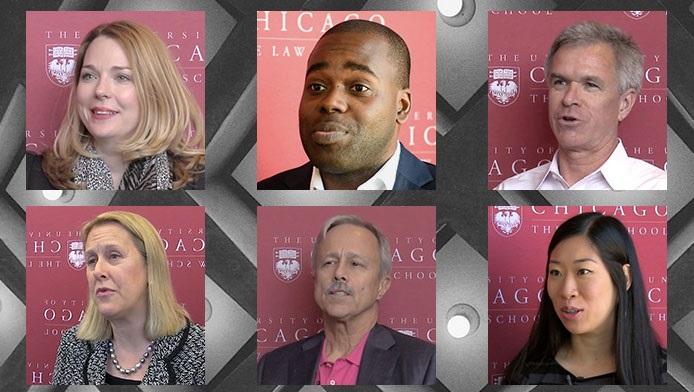The Gift of the Chicago Law Moment

A 1980 Law School graduate once moved a tough mass tort case forward by applying legal analysis he’d learned in a class taught by Senior Lecturer Richard Posner, a federal appellate judge. A 1990 alumna was so moved by her experience on the Mandel Legal Aid Clinic that, years later when she was a mayor, she drew on that inspiration when launching a legal aid clinic for her residents. A member of the Class of 2005 learned to analyze the interplay between law and economics, and that thinking regularly informs her work at the Securities Exchange Commission.
In each case, an idea that began at the Law School rippled out into the world, changing the way a member of our community thought about a legal case, the law, or even society—sometimes in ways that differed starkly from their workplace peers.
“One of the great things about this place is that you learn large concepts and how to analyze legal issues,” said David Cross, ’80, the alumnus who applied Posnerian analysis to a mass tort case as a young lawyer. “You don’t necessarily learn all the legal rules, and I was a little worried when I went into practice that maybe that was going to be a hindrance.”
Instead, it was a boon; he had learned to think. It was also an experience so familiar to Law School graduates that, earlier this year, we gave these intellectual sparks a name—Chicago Law Moments—and began asking alumni to share their stories.
Everyone we asked had one—even many of our newest alumni, who found themselves thinking differently about everything from decision making to public interest work to leadership skills.
Some of these sparks were ideas, others were experiences; for some, their “Moment” was something that stretched out over the course of law school—it was an approach, a way of thinking, or a framework that they later realized had changed their perspective.
Chicago Law Moments, alumni have said, don’t always announce themselves. They often start as seeds—an idea offered by a professor, a single clinic experience, or a question raised by a fellow student—and then grow, nourished in the idea-laden soil of the Law School. Sometimes, their significance isn’t felt until much later. Chicago Law Moments can be specific—a 1995 graduate still thinks about limitations on freedom of contract the way David Strauss, the Gerald Ratner Distinguished Service Professor of Law, taught her to in Elements of the Law. They can also grow into a broader worldview: an ability to see solutions that others don’t, or the ability to connect dots and see the larger framework behind a question.
And although there is no one typical spark, no one typical story, all reflect the UChicago culture in which they were conceived.
“The Law School taught me how to look at all angles of a situation, a problem, or an environment dispassionately without losing my natural passion for my view,” said Debra Snider, ’79, the author of three books, as well as the former executive vice president, general counsel, and chief administrative officer of Heller Financial and a former partner at what was then Katten Muchin & Zavis. “That, when you think about it, is extraordinary. At the Law School, the Socratic Method caused me to realize that very, very bright people can differ violently on how they see something—and none of them is wholly right or wrong. All the pieces add up to what we choose to call objective reality. This realization was woven through my entire business and writing career, and I can see what a huge gift it was.”